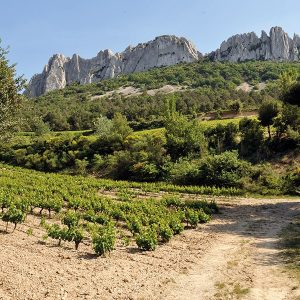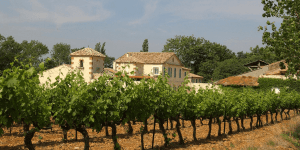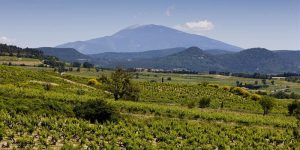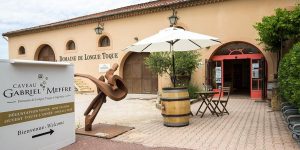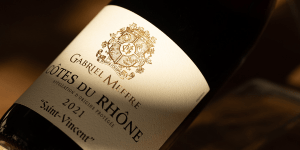Lighter bottles, less energy
Efforts to reduce the weight of a some of our bottles is producing compelling results. Wines are now in bottles of 410g compared to 570g previously. A glass manufacturer helped our winery to design the lightest emblazoned screw-top bottle on the market.”
Davy Salanon – Area Manager, O-I France (glass manufacturer)
“We wanted to lighten specific models for our clients. Gabriel Meffre’s ambitions in terms of environmental responsibility were in line with ours. We explored ways to reduce the weight of a first model by about 20%. It’s an extremely positive achievement that benefits both of our companies: we get to develop our ecodesign expertise, while Gabriel Meffre gets to stand out by offering a product that is more in line with the environmental expectations of its customers.”
This year, the “lightweight” programme is continuing with other engraved bottles. QSE Manager Audrey Chaufournier says: “Plans will be finalised and moulds manufactured in September for some of our major Export brands such as Wild Pig and Louis Bernard. Our aim is to reduce the weight of our bottles even further, while maintaining their visual and technical integrity. We estimate savings of 314 tonnes of glass a year.”
Why reducing our environmental impact ?
Slashing the weight of our bottles means reducing the company’s carbon footprint across the product’s full life cycle, from shipment by the glass manufacturer to delivery for end customers.
“It’s also made a difference to how our stock is handled by our staff, who now have lighter loads to carry. Consumers who buy boxes of our wines also benefit from this change since they are carrying and using less glass. Even if glass is one of the most environmentally virtuous materials, it’s never a bad thing to improve where you can!” explains Audrey.
With 2.5 million bottles produced annually, 250 tonnes of glass are saved every year. This equates to 178 tonnes of CO2, equivalent to 14,000 car kilometres, 1.8 tonnes of paper or 20 Paris-London return flights.
“We’ve been investigating lighter bottles for a while, because bottles are heavy to produce and transport. While consumers have long associated lightweight bottles with poor quality, this is no longer the case. They have taken in consideration the environmental benefits of reducing our impact every step of the way: production, shipment, recycling,” specifies Audrey.
Not to mention that manufacturing comes with its own challenges since the new bottle needs to be just as visually alluring and robust as the old one. “After a series of tests at the glass manufacturer, the bottles were put through all the usual life-cycle processes: washing, filling and corking through to packaging and palletising, before final delivery. The full process took a year,” concludes Audrey.
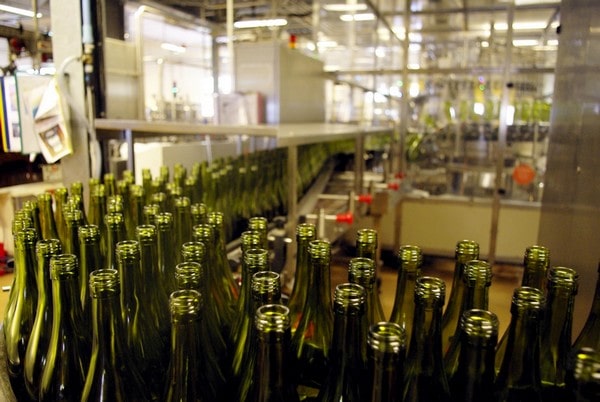
An ecodesign and responsible purchasing charter aimed at our partners
Our Winery takes a comprehensive approach to selecting the finest raw materials available. “Our “dry materials” purchasing department always asks detailed questions on the environmental impact of each component of the product, be it the wine capsules, paper, glue or labels.”
The tangible results include a charter aimed at the Winery’s partners created to “promote products made from renewable, recyclable and recycled materials helping to reduce waste at source.”
Audrey adds:
“The idea was to question our partners to encourage them to think about reducing the amount of waste they generate too. We ask our suppliers to point us towards more eco-friendly alternative solutions as well as to keep us informed about their R&D projects.”
Currently 84% of the waste generated is recycled, so there is still work to be done. In the coming years, the objective is to find solutions to recycle the remaining 16%, especially for components such as label adhesives.
In this article, you have discovered the testimony of a member of the Gabriel Meffre team, it is:
Audrey Chaufournier, QSE Manager
Rubrics
Découvrez plus d'articles...

The vineyard and wine cellar in winter
What happens in the world of wine during the winter period? After the hustle and bustle of autumn, the harvests and vinification process, comes winter, a season devoted to maturation and looking after the vines.

In 2018, we will continue to strive to be a Responsible Company!
In this new year, our wish to help build a world that respects both mankind and the environment is as strong as ever. This can be seen through the number of our projects for 2018 that are closely related to our convictions as a Responsible Winery. We’re delighted to be given the opportunity to tell you about them!

Discovering the art of pairing wine and chocolate
A morsel of white chocolate, Black Forest gâteau, pieces of stem ginger wrapped in chocolate, or Mexican chicken in chocolate sauce—all very appetising, but which wine would you serve with each one? Food and wine pairings factor in a combination of elements, such as the terroir, our powers of concentration, the circumstances of the tasting session, our sense memory and more. We guide you through some of the basic principles of this fascinating world!
